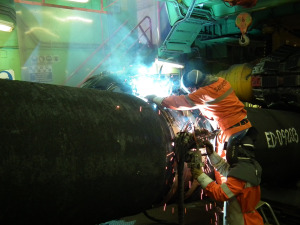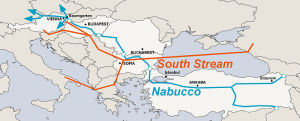South Stream’s Out, Who’s In?
 On December 1, during a state visit to Turkey, Russian President Vladimir Putin announced, alongside his Turkish counterpart, President Erdogan, that the vaunted South Stream pipeline project was terminated. The South Stream Pipeline was part of Russia’s state-gas company Gazprom’s effort to modernize its European gas distribution network, which currently still runs through former Soviet republics like Ukraine. The Pipeline was envisaged to go through the Black Sea, land in Bulgaria, and make its way across the Balkans to Austria and Italy, giving countries along the way a direct supply route – much like Germany does through “Nord Stream”. The European Union raised protest to the project, citing European anti-monopoly laws that prevent a company from controlling both the extraction and dissemination of natural gas, and in August, Bulgaria stopped work on South Stream. In light of this opposition, Russia has given up on South Stream, and instead has announced that it will support the creation a “gas hub” on the Greco-Turkish border – giving Turkey a new place in Russia’s gas network.
On December 1, during a state visit to Turkey, Russian President Vladimir Putin announced, alongside his Turkish counterpart, President Erdogan, that the vaunted South Stream pipeline project was terminated. The South Stream Pipeline was part of Russia’s state-gas company Gazprom’s effort to modernize its European gas distribution network, which currently still runs through former Soviet republics like Ukraine. The Pipeline was envisaged to go through the Black Sea, land in Bulgaria, and make its way across the Balkans to Austria and Italy, giving countries along the way a direct supply route – much like Germany does through “Nord Stream”. The European Union raised protest to the project, citing European anti-monopoly laws that prevent a company from controlling both the extraction and dissemination of natural gas, and in August, Bulgaria stopped work on South Stream. In light of this opposition, Russia has given up on South Stream, and instead has announced that it will support the creation a “gas hub” on the Greco-Turkish border – giving Turkey a new place in Russia’s gas network.
The cancellation of South Stream was good news for Ukraine’s status as a transit country. In the past, Gazprom has frozen supplies for Ukraine due to failure to pay debts and geopolitical struggles, but these periods (in 2006 and 2009) proved damaging for Gazprom’s European customers who relied on Ukraine’s gas distribution network. In that sense, natural gas as a weapon in Ukraine can only be used so long as Europe is not damaged, and the only way to ensure that is to remove Ukraine from the equation altogether. In northern Europe, Gazprom was able to construct the Nord Stream pipeline which transports gas across the Baltic Sea to Germany, assuring Germany a continuous supply of Russian natural gas in the case of any tensions in Ukraine. Southern and Central Europe, however, do not have such a pipeline, and if Russia wanted to court their favor to aid them within the EU, it would not be smart to cut gas flows to Ukraine. In the past, when Gazprom froze Ukraine’s gas in wintertime, Ukraine decided to consume gas supplies that were destined for other European countries. Such a crisis would not do well to Moscow’s already tattered reputation across Europe, it would only further antagonize it. Therefore, with South Stream finished, Ukraine can entertain the possibility that Russia will not use natural gas to its fullest extent against Kiev, in the immediate future.
Southern Europe, however, still suffers from this cancellation. Many countries and companies had already begun construction on South Stream and they hoped that the deal would provide jobs and more energy for the region. Italian oil firm Saipem, a 45% shareholder in the South Stream project, has been severely damaged. Bulgaria’s government was also furious at the EU’s insistence to halt the project, because it had invested so much in its portion of South Stream, along with the fact that Bulgaria gets 90% of its natural gas from Russia. Serbia, on its part, expressed discontent with the announcement that South Stream was done, and now the country finds itself with a lost investment and unsure future alternatives. For the European Union as a whole, this means that large countries like Germany and France along with nations such as Poland and the Baltic states – who have long insisted on a strong EU response against Russia’s actions in Ukraine – have succeeded in setting the tone for EU policy on Russia, but it can also foretell frostier relations with weaker members of the Union who will see themselves affected by the annulment of South Stream.
Ankara stands to gain, clearly, by this development. The new “gas hub” will become a new transit point of natural gas which will elevate Turkey’s position on the European energy market, giving the country a certain leverage vis-à-vis the EU. Moscow also seeks to gain by re-routing its gas to Europe through Turkey which would still accomplish its geopolitical goal of side-stepping Ukraine. The EU might now find it harder to diversify its sources of natural gas in the Caspian region with Azerbaijan and other natural gas states, because their natural gas infrastructures need to cross Turkey, and now that Turkey and Russia have struck this new deal – which will provide Turkey with much more gas than Azerbaijan or Turkmenistan can – it might be more difficult to spearhead new initiatives to bring gas over to Europe.
The sudden cancellation of South Stream is yet another indicative of the frosty relations between Russia and the European Union. Brussels cited EU law this time to stop Gazprom’s expanding control of its gas market, but if looked at on a broader time scale, Gazprom has been in violation of EU law for many years – only now that the political situation has deteriorated does Brussels invoke it. Moscow has also shown that it will not lay its natural resources subject to the terms of its customers, and it too has begun to diversify its clientele to not be so dependent on Europe for revenue – as evidenced by the deal with Turkey and recent negotiations with China.

